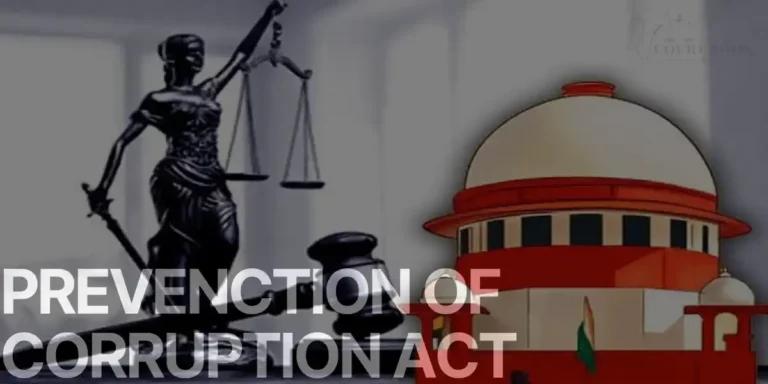The Supreme Court recently clarified a crucial aspect of the Prevention of Corruption Act, 1988. In a judgment delivered by Justices Pankaj Mithal and Ahsanuddin Amanullah, the Court emphasized that merely recovering tainted money is not enough to convict an accused unless the complete chain of evidence is established—this includes proof of demand, acceptance, and recovery.
This ruling came from an appeal filed by the State Lokayuktha Police against a public servant, C.B. Nagaraj, who was accused of demanding a ₹1,500 bribe from a school teacher for forwarding a caste certificate. The trial court had convicted Nagaraj, but the High Court of Karnataka later acquitted him, finding the evidence insufficient regarding the demand of the bribe.
Read also: Supreme Court Seeks Centre's Response on Suggestions to Reform Sex Education and Real-Time
Quoting the Court:
“The observation of the High Court to this extent is correct that just because money changed hands, in cases like the present, it cannot be ipso facto presumed that the same was pursuant to a demand, for the law requires that for conviction under the Act, an entire chain—beginning from demand, acceptance, and recovery has to be completed.”
The case background revealed that Nagaraj was working as an Extension Officer when the complaint was filed. The teacher had applied for a Validity Certificate under Category-II A, which required a spot inspection report. It was alleged that Nagaraj demanded a bribe for forwarding this report. A trap was laid, and tainted money was recovered from him. However, Nagaraj consistently claimed the money was a repayment of a personal loan.
Read also: Supreme Court: Referring to Trial Court as "Lower Court" is Against the Constitution
The Trial Court convicted Nagaraj under Sections 7, 13(1)(d) read with 13(2) of the Act. He was sentenced to six months and two years of simple imprisonment along with fines. However, the High Court acquitted him, citing doubts over the initial demand. The Supreme Court, after thoroughly reviewing the facts, upheld the High Court’s decision, stating:
“In the case at hand, when the initial demand itself is suspicious, even if the two other components—of payment and recovery—can be held to have been proved, the chain would not be complete.”
The Court noted discrepancies in the prosecution’s evidence. The complainant, in his deposition, initially denied knowledge of the inspection report and later accepted its existence when confronted with documentary evidence. Furthermore, the spot inspection had already been completed and forwarded, raising questions about the necessity of a bribe.
The Court added:
“A penal law has to be strictly construed. Even where a reverse onus under specific statute can be placed on an accused, there cannot be a presumption which casts an uncalled-for onus on the accused. Mere recovery of bribe money is not enough if the chain of demand, acceptance, and recovery is not proved.”
In conclusion, the Supreme Court dismissed the appeal, stating:
“On an overall conspectus of the facts and circumstances of the case and the discussions made hereinabove, we do not find any ground made out by the Appellant requiring interference by this Court. The Impugned Judgment is, hence, upheld.”
The ruling reiterates a crucial legal principle: Without solid proof of demand, mere recovery of bribe money cannot lead to a conviction under the Prevention of Corruption Act.
Case Title: STATE OF LOKAYUKTHA POLICE, DAVANAGERE VERSUS C B NAGARAJ
Appearance:
For Appellant(s) Mr. D. L. Chidananda, AOR
For Respondent(s) Dr. Joseph Aristotle S., Sr. Adv. Ms. Priya Aristotle, Adv. Mr. Ashish Yadav, Adv. Ms. Anagha S. Desai, AOR















